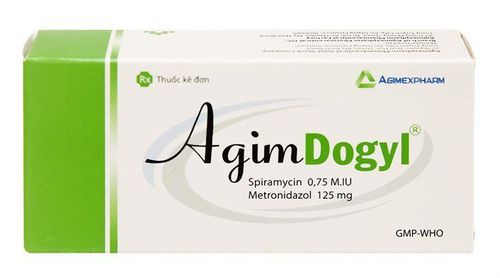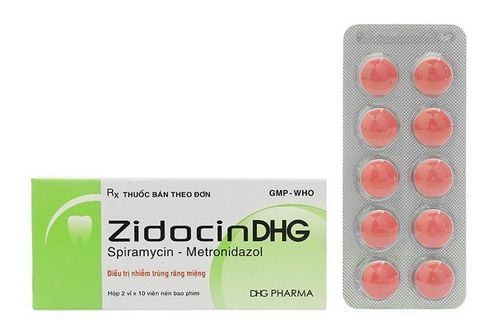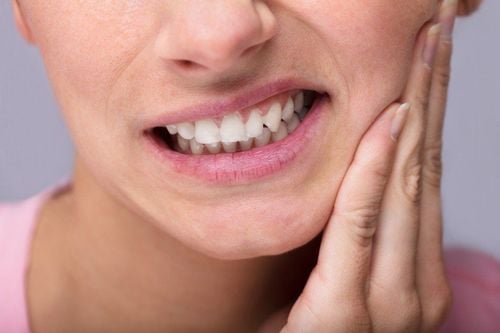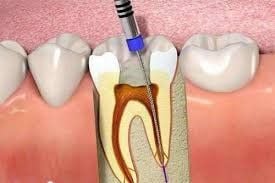This is an automatically translated article.
The article was professionally consulted by Specialist Doctor II Nguyen Khanh Nam - Doctor of Dental - Jaw - Facial - Department of General Surgery - Vinmec Nha Trang International General HospitalTeeth are sensitive to hot or cold temperature stimuli and external forces will cause toothache or tooth sensitivity. The cause of toothache is usually from the pulp or ligaments. Treatment of sensitive teeth is mainly about maintaining oral hygiene and visiting the dentist regularly.
1. What is the definition of sensitive teeth?
Teeth are made up of 3 parts from outside to inside: enamel, dentin and pulp. Enamel covers the dentin. The innermost pulp layer contains blood vessels and nerves, if the enamel coating is worn away, it will reduce the ability to protect dentin. At that time, the nerve endings in the pulp will be directly affected by hot or cold temperatures from drinks and foods. Such nerve stimulation produces toothache, tooth sensitivity, also known as tooth sensitivity.Sensitive teeth is a common dental problem common in young and middle-aged adults, which can progress over time.
2. Causes of sensitive teeth are easy to hurt
Several causes are thought to cause teeth to become more sensitive.Pulp pain: is the feeling that the nerves in the tooth pulp react. Pulp pain is caused by deep damage from the enamel to the pulp, exposing the nerve endings in the pulp. There are many causes of toothache such as cracked or decayed teeth. Tooth decay is one of the most common causes of toothache. Cavities occur when acids from plaque bacteria penetrate the enamel causing the loss of minerals from the teeth. If tooth decay progresses to the pulp layer, it will make teeth sensitive and painful. Affected ligaments: the periodontal ligaments that attach the teeth to the jawbone and sense the position of the teeth when we chew, can also cause toothache. People undergoing orthodontic treatment will experience toothache due to the influence of the periodontal ligament. Oral care products such as oxidizing whiteners such as peroxide penetrate the teeth causing tooth sensitivity and pain.

3. Remedies for toothache
If a toothache occurs, gargling with warm water or applying an over-the-counter topical pain reliever to the painful area will provide immediate relief. Preventing toothaches caused by tooth decay or gum disease involves a combination of visits to the dentist and a regular oral care routine. If you have a toothache, look for oral care products specifically designed for sensitive teeth and gums.Super soft toothbrush: the toothbrush has a cross-bristled design for better cleaning between and behind the teeth. Super soft bristles help remove plaque while protecting teeth and gums from irritation, even during toothache. Floss for sensitive gums: floss designed for sensitive gums to slide between tight teeth without fraying. Toothpaste for sensitive teeth: For a comprehensive oral care routine, use toothpaste for sensitive teeth to combat tooth sensitivity, tooth decay, plaque, gingivitis, tartar , at the same time whiten and freshen breath. During a dental exam, the dentist will decide if the toothache needs a filling or a root canal or tooth extraction. Even with fillings or gum surgery, you can still notice that your teeth are still sensitive. Therefore, patients need to maintain proper oral care habits.
In summary, toothache caused by sensitive teeth is a common dental condition. It is usually caused by damage to the pulp or periodontal ligament. Following a regular oral care routine is a way to promote oral health, help prevent tooth decay, and manage tooth pain. Regular dental exams and cleanings will help prevent and treat pain caused by sensitive teeth.
Dentistry - Jaw - Facial Department of Vinmec International General Hospital is the specialty in charge of intensive pathological and cosmetic treatment on the entire tooth structure (teeth, bone, pulp,...), jaw (palatine, jawline, jaw joint,...) and face (forehead bone, cheekbone, temporal bone,...). Therefore, when having any problems with their teeth, customers can directly contact the hospital for examination and timely treatment indications from a specialist doctor.
Please dial HOTLINE for more information or register for an appointment HERE. Download MyVinmec app to make appointments faster and to manage your bookings easily.
Reference source: livescience.com - crest.com/en-us













